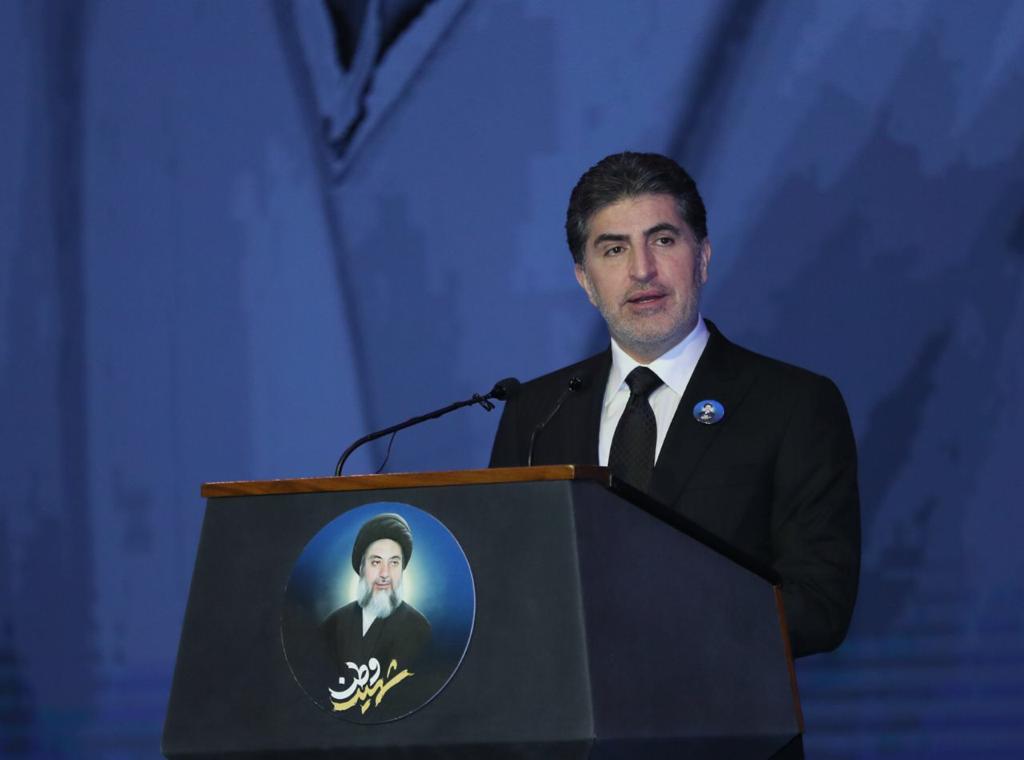
2021-02-21T20:33:20.000000Z
Erbil, Kurdistan Region, February 21, 2021
The President of the Kurdistan Region Nechirvan Barzani attended a memorial service today in honor of Iraq’s fallen heroes and the 18th anniversary of the martyrdom of the late Ayatollah Muhammad Baqir Al-Hakim. The Leader of Iraq’s National Wisdom Movement, Mr. Ammar Al-Hakim attended today’s ceremony here in Erbil.
The President delivered the following speech at the Remembrance Day:
In the name of God the Merciful
Dear Mr. Ammar Al-Hakim,
Honorable guests,
I am pleased to welcome you to the Kurdistan Region and the city of Erbil. We have gathered here today to honor all the martyrs of Iraq and Kurdistan; in particular, we pay tribute to the 18th anniversary of the martyrdom of the Grand Ayatollah Muhammad Baqir Al-Hakim, the Shaheed Al-Mehraab. We pay tribute to all the martyrs of Kurdistan and Iraq; we salute them and their families.
It is very natural today for us all to gather here on this occasion that concerns a noble family like the Al-Hakims, since the great people of this family have always sought to bring together all religions, build partnerships and fight the common struggle between the peoples of Iraq and Kurdistan. It is very important to start today by strengthening our relations, since this was always the desire and endeavor of the Shaheed Al-Mehraab (Martyr of the Sanctuary).
Today, more than ever, the Iraqis, including Shiites, Kurds, Sunnis and all other components, are calling on the political parties to partner and work together in order to achieve security, stability and construction in Iraq, and this was the approach adopted by the Shaheed Al-Mehraab and our historical leaders.
The great martyr and mujahid of Iraq, Mr. Muhammad Baqir Al-Hakim, was one of the founders of the Islamic Resistance Movement in Iraq against the dictatorial regimes in the country. He was one of the greatest Iraqi scholars in the fields of Sharia, philosophy, politics and economics, and therefore he had a very clear vision for solving problems and for the future of Iraq. For this reason, he was a believer in the union of religions in Iraq, as he was already working to achieve this goal. He also believed that he should not deviate from the true approach of his father, which was the struggle to end dictatorship, the common struggle fought together with the people of Kurdistan. The role of the martyr Grand Ayatollah Muhammad Baqir Al-Hakim in the “Conference in Support of the Iraqi People” in 1986 in Tehran was to truly support the rights of the people of Kurdistan. There was a great understanding and coordination between the late Idris Barzani and Shaheed Al-Mehraab regarding the conference decisions. This coordination continued in the aftermath of the conference. The sincerity of the Grand Ayatollah Muhammad Baqir Al-Hakim in supporting the rights of the people of Kurdistan in all circumstances was the subject of the highest degree of respect and gratitude from the Kurdish leadership and the people of Kurdistan. This contributed to paving solid ground for President Masoud Barzani and Grand Ayatollah Muhammad Baqir Al-Hakim to hold numerous and continuous meetings in order to lay the foundations for the future order of Iraq on the basis of partnership and federalism. At the London conference in 2002, a decision was taken on a system based on those foundations for the future of Iraq, which was represented by a democratic and federal system in which all components shared its administration. Here, too, we must remember the role of the great Iraqi patriot, Mr. Abdulaziz Al-Hakim, who was present at all the Iraqi opposition conferences, during the period of the Governing Council, and throughout his life, a loyal supporter of the rights of the people of Kurdistan.
There is no doubt that today we also expect the same from my dear brother, Mr. Ammar Al-Hakim, and all our brothers from the Al-Hakim family and the Shiite Bayt (family), because this partnership and the joint struggle has a deep history between us. The relationship of the Barzan family and the Kurdistan revolution with the Al-Hakim family, the Shiite Bayt, and the political movement is a relationship based on believing in the legitimate demands of both parties. Thanks to the relationship between the late Mulla Mustafa Barzani and the late Ayatollah Imam Sayyed Mohsen Al-Hakim, a deep friendship was formed between the people of Kurdistan and the supporters and followers of the Ahl Al-Bayt. And following the continuous messages of the late Mustafa Barzani to Imam Sayyid Mohsen Al-Hakim explaining the conditions of the people of Kurdistan and the legitimate Kurdistan revolution to his Eminence, Imam Sayyid Mohsen al-Hakim issued a fatwa in 1965 prohibiting fighting against the Peshmerga and the Kurds during the September Revolution. In 1974, the great martyr of Iraq, Grand Ayatollah Muhammad Baqir Al-Sadr, reissued the same fatwa prohibiting fighting the Kurds. Likewise, during the drafting of the constitution, Grand Ayatollah Ali Al-Sistani did not stand in any way against federalism, but rather supported the wording that was written in the constitution regarding the rights of the people of Kurdistan in the Iraqi constitution.
These historical attitudes created great trust and love between the Kurds and Shiites in all fields, and also contributed to the formation of a real joint struggle between the two parties, the results of which were the overthrow of the dictatorial regime in Iraq, which was the greatest achievement for the people of Iraq and Kurdistan. This common struggle was renewed again in the war against ISIS, and among its results was the joint work between our parties and all of us in Iraq and the defeat of ISIS.
But after the war against ISIS, an undesired situation was created, which we are not satisfied with, and we have no doubt that many of our Shiite brothers are not satisfied with either, especially those who lived through the difficult phase of the joint struggle against the dictatorial regime, or those who are aware of that hard period of our history. Our blood was shed together in the war against the dictatorship and ISIS for the same goal, and today also as we remember our martyrs, we must demonstrate through understanding and joint action, our loyalty to the history of partnership and common struggle between us, and to establish a true alliance. We are fully prepared, and I am confident that the devotion of Sayyid Ammar al-Hakim to our historical relations and our common struggle, as well as the dedication of other Shiite leaders to that history, is an excellent basis for the strengthening of this relationship.
There is no doubt that this partnership should include the participation of our Sunni brothers as well, since no partnership between us is complete without the participation of the Sunni Arabs.
Dear guests, honorable attendees,
We need to meet again together and have a frank discussion. The basis of our discussions must be that the problem of any nationality or component cannot become a victory for another Iraqi component, but rather it will have dire consequences for all components of this country, and the development of any Iraqi region and governorate will be a factor of good and progress for all Iraqis.
The main problem for Iraq since its inception has been the absence of partnership and participation that include all components of Iraq in the administration of the country, and for this reason Iraq has not been without problems since its inception. The two Arab components of Iraq, including Sunnis and Shiites, know that neither of them alone, nor both of them without the Kurds, can achieve balance in the country. Therefore, the participation of all components of Iraq in managing the country is the only way to successfully manage Iraq. Also, this participation is the only way to civil, service and administrative governance that satisfies all citizens of Iraq.
It is not permissible for any Iraqi component to desire the cancellation of another component. This desire was not fulfilled in the past, nor will it be fulfilled in the future. This emerging dispute was not in any way expected by our founding fathers of our liberation and political movement, and it is now not in the interest of the Iraqi people.
The stability, progress, and building of the Kurdistan Region should be seen positively by all political parties in Iraq, because we are part of Iraq. The development of the Kurdistan Region is a development for a part of Iraq and for all Iraqis. Just as the progress and construction of Najaf, Karbala, Basra, Anbar, Tikrit and Mosul is seen as progress for the Kurdistan Region. The wish of the people of Kurdistan is that the whole of Iraq be stable, safe and developed, because that would be a matter of well-being of all of us, and it would become a factor for increasing job opportunities, economic growth and scientific progress throughout Iraq.
God has endowed Iraq with tremendous wealth, and the whole world is witnessing the abilities and vigor of the Iraqis, but unfortunately the political differences and the failure to take into account an equal partnership between all components of Iraq in the decision and in the administration of the Iraqi state made the components of this country live under difficult conditions and malfunctioning services.
After all this long history of Iraq’s problems, and after citizens’ protests, it is necessary that we begin today with a serious dialogue for a successful management of Iraq with the participation of all components. It is not permissible to wait for election conflicts and campaigns, because the people of Iraq are aware, and no election game and campaign can make them ignore the Iraqi reality. Those who carry out the reforms in governance and in the political and administrative decisions in Iraq, they will surely attract the support of the majority of Iraqis.
For us, we are ready to start a serious and frank dialogue in order to reform the political process and the administration of Iraq. Here, too, and on this blessed occasion, we direct our call to all Iraqi parties to start doing so. Our success is through partnership and joint action. In the past, exclusion and marginalization led to the destruction of Iraq, and there is no doubt that this approach will destroy our future as well. Iraq cannot be stable without equal partnership and shared responsibilities.
Honorable guests,
The attack of ISIS and their growing power and the occupation and destruction of parts of Iraq by the terror group was due to the marginalization and the absence of partnership and consensus in Iraq. President Masoud Barzani raised his concern many times and warned that unilateralism would lead Iraq to ruins. As a result, we now see parts of Iraq destroyed by ISIS. The Peshmerga, the Iraqi army and the Popular Mobilization Forces have offered thousands of martyrs in order to stop and defeat ISIS.
In order to defeat extremism in Iraq and save the country from future destructions, similar to the ISIS war, and for us to be able to respond to the demands of the people, we must return to the Iraqi constitution, and all regions must have the right to manage their affairs, and we must reach consensus and partnership in the administration of Iraq.
We hope for a developed Iraq, an Iraq that can achieve progress and secure services for its people. Once again, we salute the pure spirit of the holy martyr, Grand Ayatollah Muhammad Baqir Al-Hakim and all the martyrs of Kurdistan and Iraq.
Welcome again,
Thank you
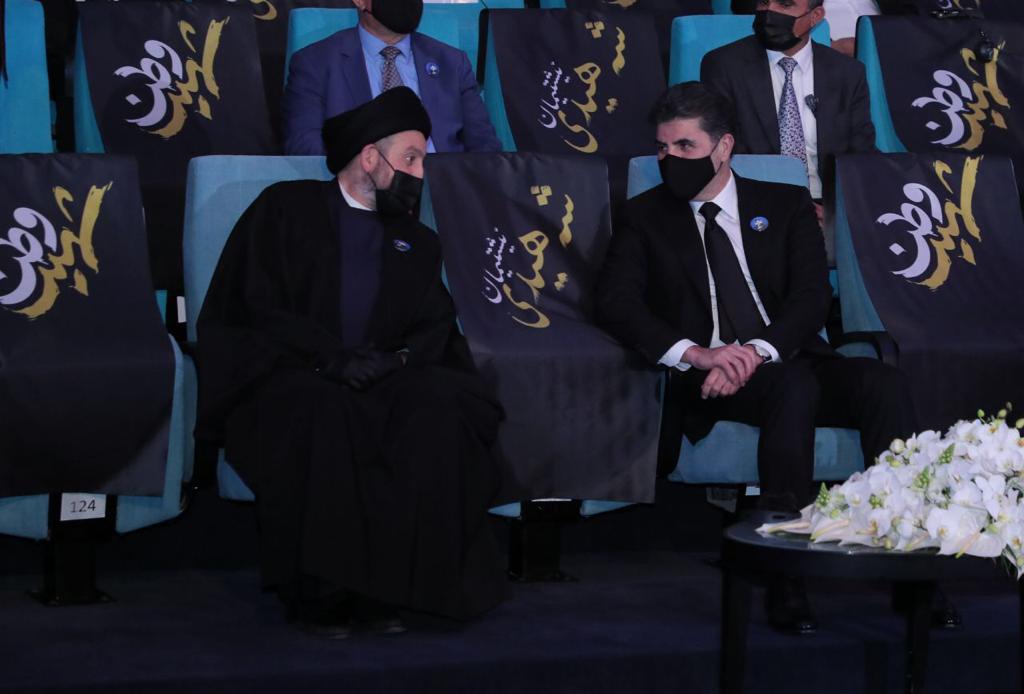
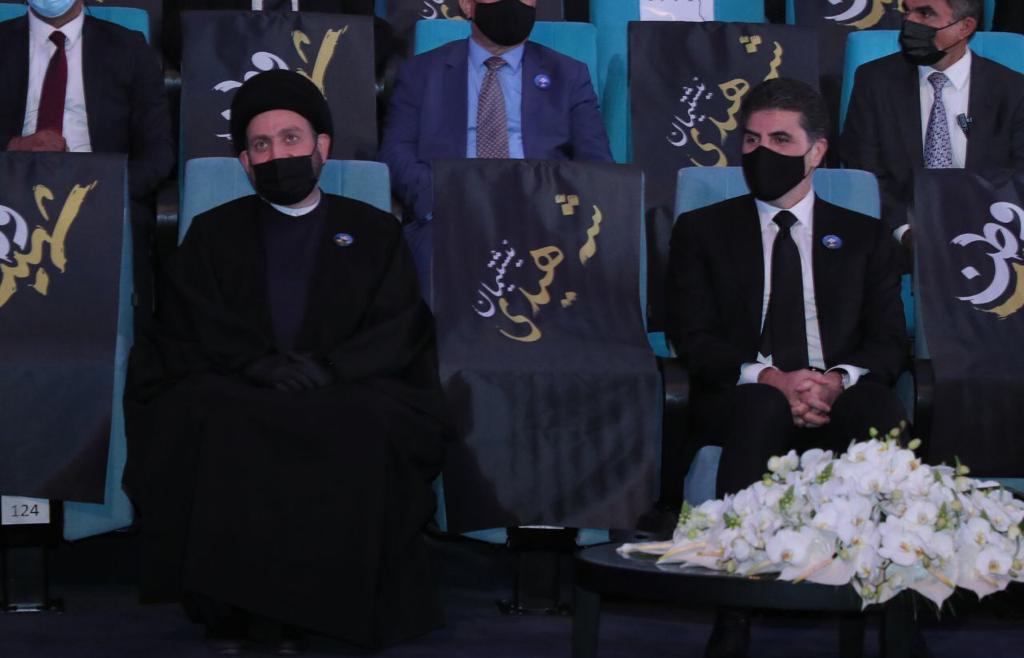
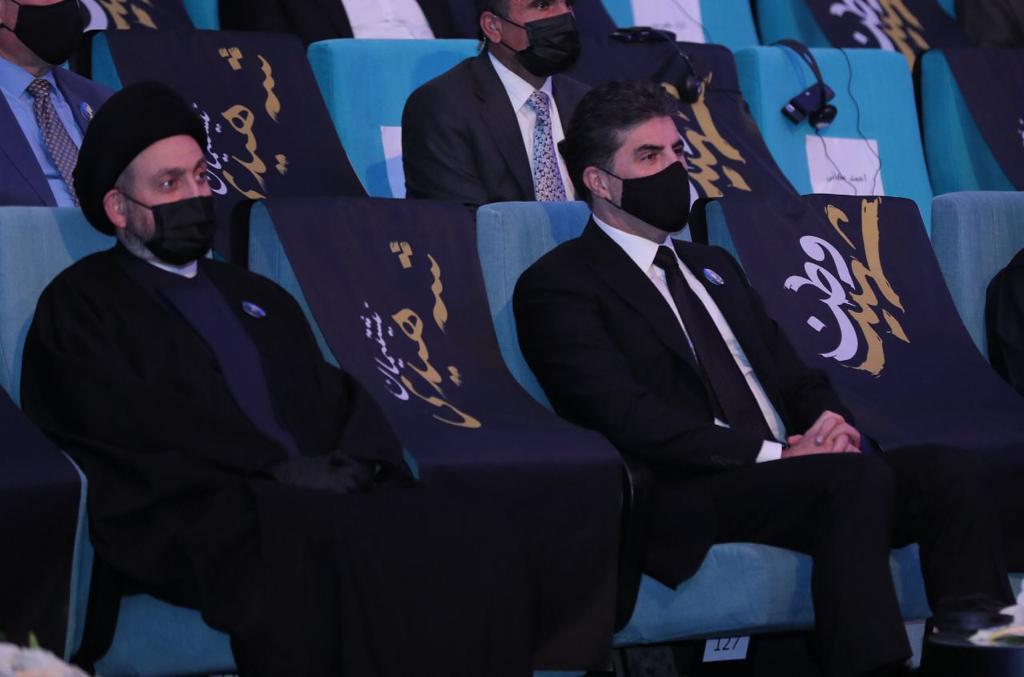
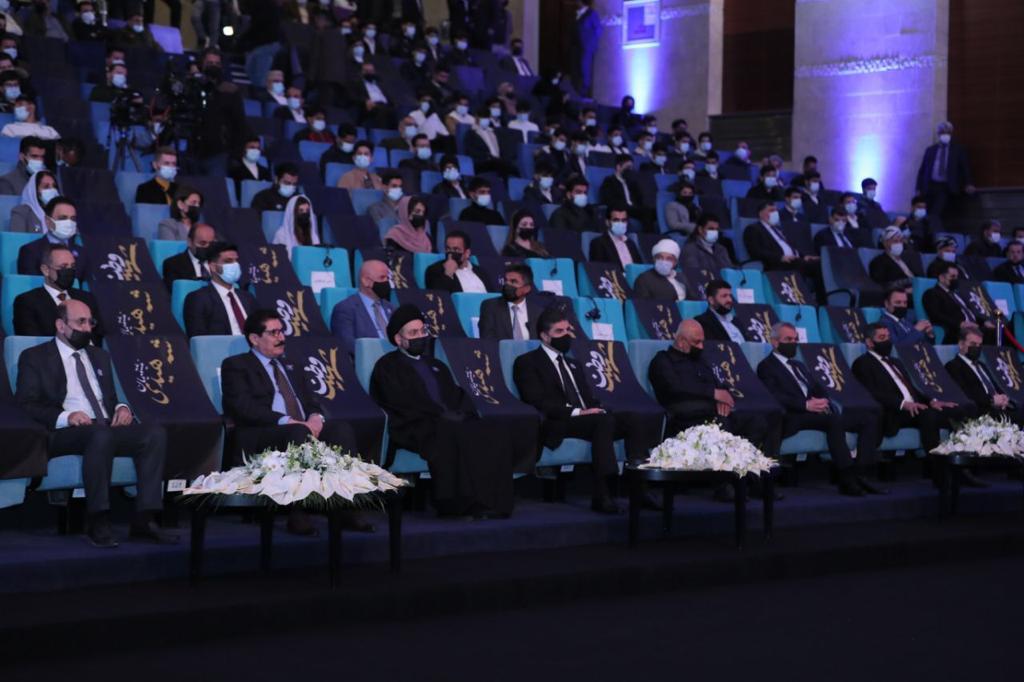
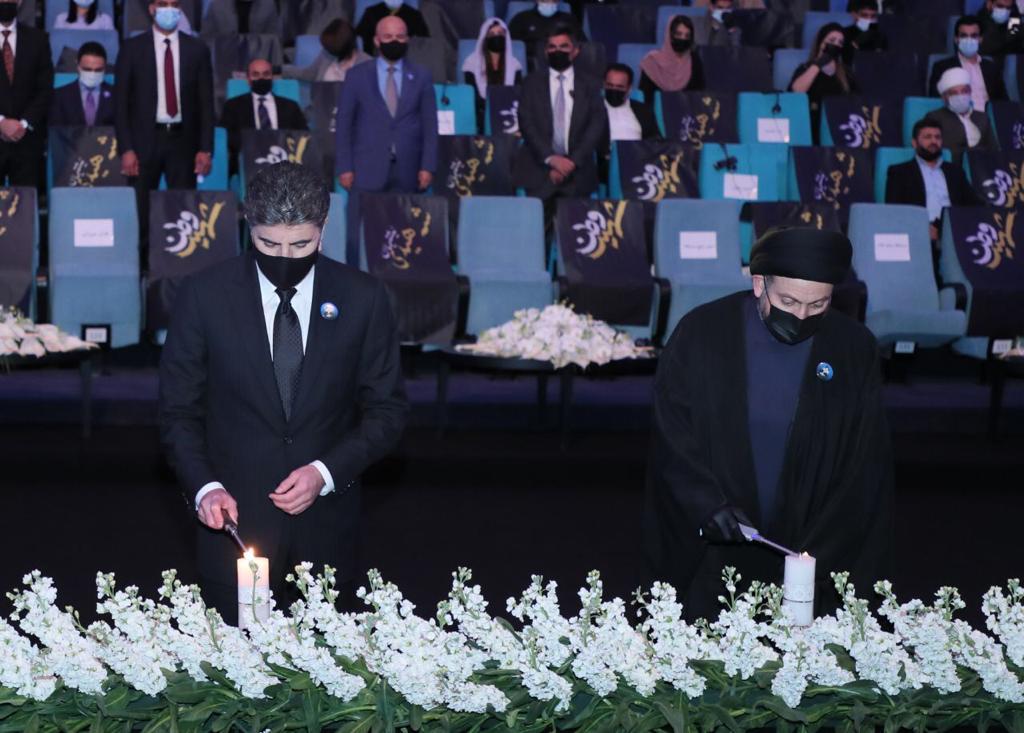
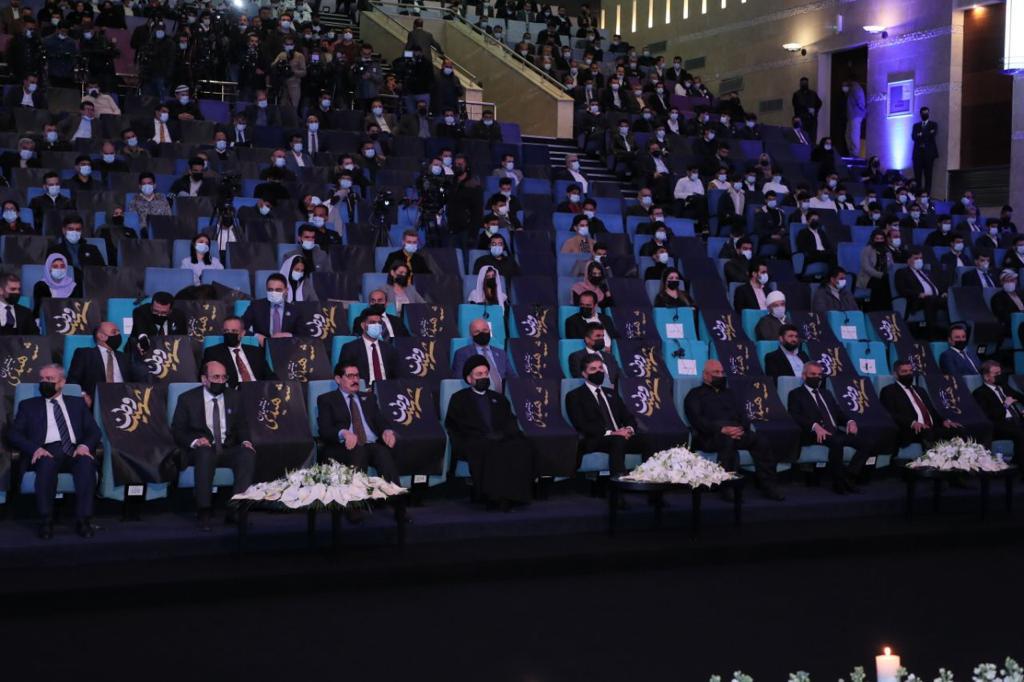
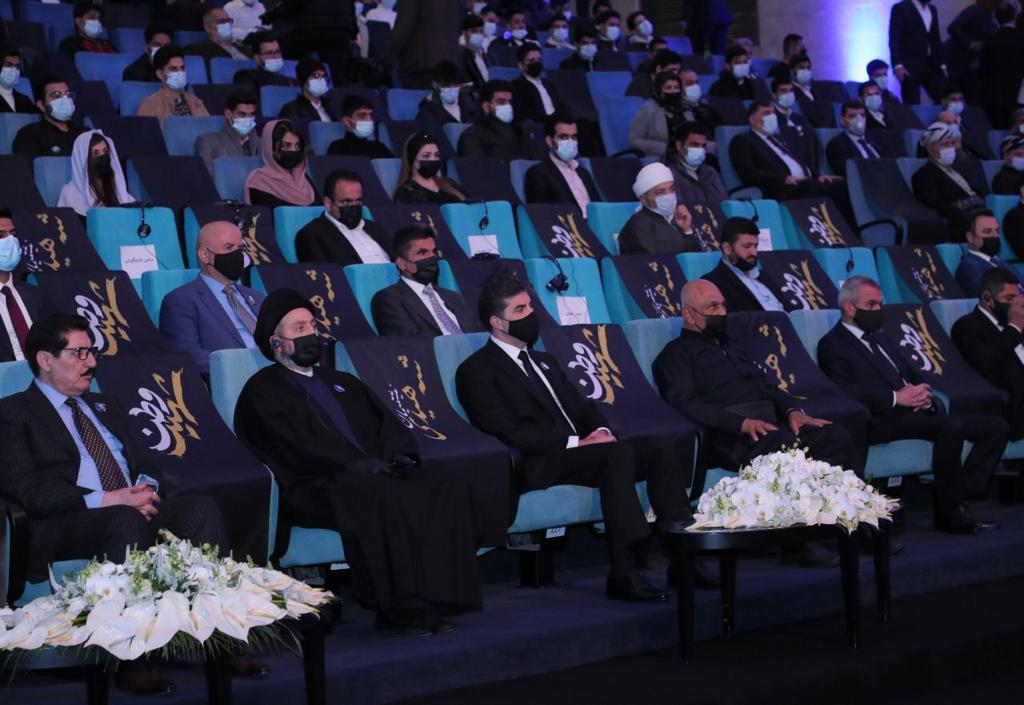
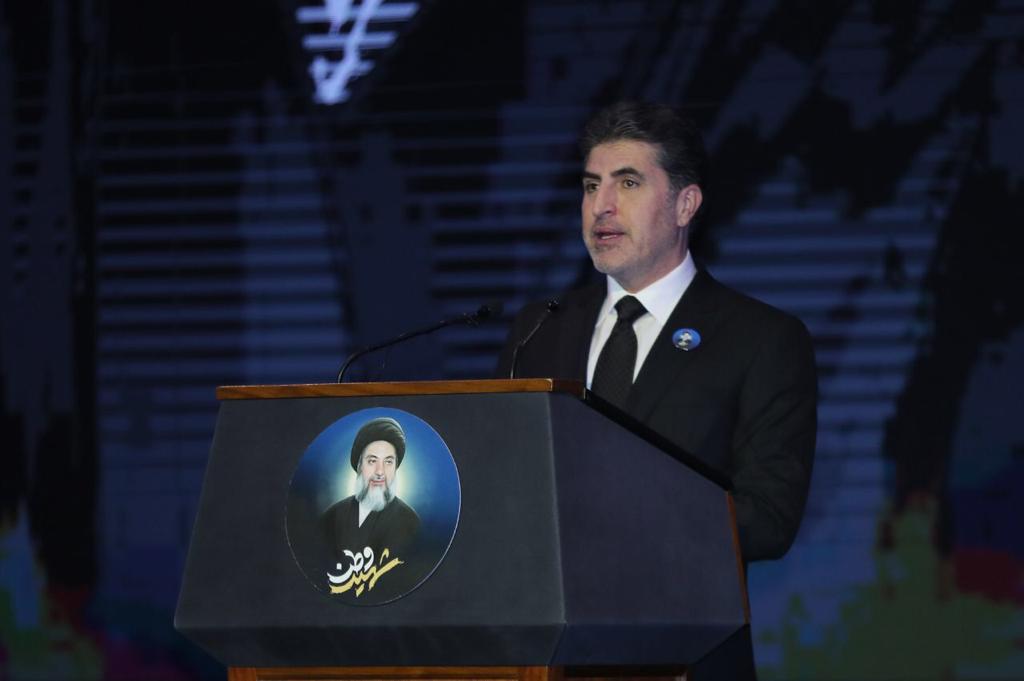
The President of the Kurdistan Region Nechirvan Barzani attended a memorial service today in honor of Iraq’s fallen heroes and the 18th anniversary of the martyrdom of the late Ayatollah Muhammad Baqir Al-Hakim. The Leader of Iraq’s National Wisdom Movement, Mr. Ammar Al-Hakim attended today’s ceremony here in Erbil.
The President delivered the following speech at the Remembrance Day:
In the name of God the Merciful
Dear Mr. Ammar Al-Hakim,
Honorable guests,
I am pleased to welcome you to the Kurdistan Region and the city of Erbil. We have gathered here today to honor all the martyrs of Iraq and Kurdistan; in particular, we pay tribute to the 18th anniversary of the martyrdom of the Grand Ayatollah Muhammad Baqir Al-Hakim, the Shaheed Al-Mehraab. We pay tribute to all the martyrs of Kurdistan and Iraq; we salute them and their families.
It is very natural today for us all to gather here on this occasion that concerns a noble family like the Al-Hakims, since the great people of this family have always sought to bring together all religions, build partnerships and fight the common struggle between the peoples of Iraq and Kurdistan. It is very important to start today by strengthening our relations, since this was always the desire and endeavor of the Shaheed Al-Mehraab (Martyr of the Sanctuary).
Today, more than ever, the Iraqis, including Shiites, Kurds, Sunnis and all other components, are calling on the political parties to partner and work together in order to achieve security, stability and construction in Iraq, and this was the approach adopted by the Shaheed Al-Mehraab and our historical leaders.
The great martyr and mujahid of Iraq, Mr. Muhammad Baqir Al-Hakim, was one of the founders of the Islamic Resistance Movement in Iraq against the dictatorial regimes in the country. He was one of the greatest Iraqi scholars in the fields of Sharia, philosophy, politics and economics, and therefore he had a very clear vision for solving problems and for the future of Iraq. For this reason, he was a believer in the union of religions in Iraq, as he was already working to achieve this goal. He also believed that he should not deviate from the true approach of his father, which was the struggle to end dictatorship, the common struggle fought together with the people of Kurdistan. The role of the martyr Grand Ayatollah Muhammad Baqir Al-Hakim in the “Conference in Support of the Iraqi People” in 1986 in Tehran was to truly support the rights of the people of Kurdistan. There was a great understanding and coordination between the late Idris Barzani and Shaheed Al-Mehraab regarding the conference decisions. This coordination continued in the aftermath of the conference. The sincerity of the Grand Ayatollah Muhammad Baqir Al-Hakim in supporting the rights of the people of Kurdistan in all circumstances was the subject of the highest degree of respect and gratitude from the Kurdish leadership and the people of Kurdistan. This contributed to paving solid ground for President Masoud Barzani and Grand Ayatollah Muhammad Baqir Al-Hakim to hold numerous and continuous meetings in order to lay the foundations for the future order of Iraq on the basis of partnership and federalism. At the London conference in 2002, a decision was taken on a system based on those foundations for the future of Iraq, which was represented by a democratic and federal system in which all components shared its administration. Here, too, we must remember the role of the great Iraqi patriot, Mr. Abdulaziz Al-Hakim, who was present at all the Iraqi opposition conferences, during the period of the Governing Council, and throughout his life, a loyal supporter of the rights of the people of Kurdistan.
There is no doubt that today we also expect the same from my dear brother, Mr. Ammar Al-Hakim, and all our brothers from the Al-Hakim family and the Shiite Bayt (family), because this partnership and the joint struggle has a deep history between us. The relationship of the Barzan family and the Kurdistan revolution with the Al-Hakim family, the Shiite Bayt, and the political movement is a relationship based on believing in the legitimate demands of both parties. Thanks to the relationship between the late Mulla Mustafa Barzani and the late Ayatollah Imam Sayyed Mohsen Al-Hakim, a deep friendship was formed between the people of Kurdistan and the supporters and followers of the Ahl Al-Bayt. And following the continuous messages of the late Mustafa Barzani to Imam Sayyid Mohsen Al-Hakim explaining the conditions of the people of Kurdistan and the legitimate Kurdistan revolution to his Eminence, Imam Sayyid Mohsen al-Hakim issued a fatwa in 1965 prohibiting fighting against the Peshmerga and the Kurds during the September Revolution. In 1974, the great martyr of Iraq, Grand Ayatollah Muhammad Baqir Al-Sadr, reissued the same fatwa prohibiting fighting the Kurds. Likewise, during the drafting of the constitution, Grand Ayatollah Ali Al-Sistani did not stand in any way against federalism, but rather supported the wording that was written in the constitution regarding the rights of the people of Kurdistan in the Iraqi constitution.
These historical attitudes created great trust and love between the Kurds and Shiites in all fields, and also contributed to the formation of a real joint struggle between the two parties, the results of which were the overthrow of the dictatorial regime in Iraq, which was the greatest achievement for the people of Iraq and Kurdistan. This common struggle was renewed again in the war against ISIS, and among its results was the joint work between our parties and all of us in Iraq and the defeat of ISIS.
But after the war against ISIS, an undesired situation was created, which we are not satisfied with, and we have no doubt that many of our Shiite brothers are not satisfied with either, especially those who lived through the difficult phase of the joint struggle against the dictatorial regime, or those who are aware of that hard period of our history. Our blood was shed together in the war against the dictatorship and ISIS for the same goal, and today also as we remember our martyrs, we must demonstrate through understanding and joint action, our loyalty to the history of partnership and common struggle between us, and to establish a true alliance. We are fully prepared, and I am confident that the devotion of Sayyid Ammar al-Hakim to our historical relations and our common struggle, as well as the dedication of other Shiite leaders to that history, is an excellent basis for the strengthening of this relationship.
There is no doubt that this partnership should include the participation of our Sunni brothers as well, since no partnership between us is complete without the participation of the Sunni Arabs.
Dear guests, honorable attendees,
We need to meet again together and have a frank discussion. The basis of our discussions must be that the problem of any nationality or component cannot become a victory for another Iraqi component, but rather it will have dire consequences for all components of this country, and the development of any Iraqi region and governorate will be a factor of good and progress for all Iraqis.
The main problem for Iraq since its inception has been the absence of partnership and participation that include all components of Iraq in the administration of the country, and for this reason Iraq has not been without problems since its inception. The two Arab components of Iraq, including Sunnis and Shiites, know that neither of them alone, nor both of them without the Kurds, can achieve balance in the country. Therefore, the participation of all components of Iraq in managing the country is the only way to successfully manage Iraq. Also, this participation is the only way to civil, service and administrative governance that satisfies all citizens of Iraq.
It is not permissible for any Iraqi component to desire the cancellation of another component. This desire was not fulfilled in the past, nor will it be fulfilled in the future. This emerging dispute was not in any way expected by our founding fathers of our liberation and political movement, and it is now not in the interest of the Iraqi people.
The stability, progress, and building of the Kurdistan Region should be seen positively by all political parties in Iraq, because we are part of Iraq. The development of the Kurdistan Region is a development for a part of Iraq and for all Iraqis. Just as the progress and construction of Najaf, Karbala, Basra, Anbar, Tikrit and Mosul is seen as progress for the Kurdistan Region. The wish of the people of Kurdistan is that the whole of Iraq be stable, safe and developed, because that would be a matter of well-being of all of us, and it would become a factor for increasing job opportunities, economic growth and scientific progress throughout Iraq.
God has endowed Iraq with tremendous wealth, and the whole world is witnessing the abilities and vigor of the Iraqis, but unfortunately the political differences and the failure to take into account an equal partnership between all components of Iraq in the decision and in the administration of the Iraqi state made the components of this country live under difficult conditions and malfunctioning services.
After all this long history of Iraq’s problems, and after citizens’ protests, it is necessary that we begin today with a serious dialogue for a successful management of Iraq with the participation of all components. It is not permissible to wait for election conflicts and campaigns, because the people of Iraq are aware, and no election game and campaign can make them ignore the Iraqi reality. Those who carry out the reforms in governance and in the political and administrative decisions in Iraq, they will surely attract the support of the majority of Iraqis.
For us, we are ready to start a serious and frank dialogue in order to reform the political process and the administration of Iraq. Here, too, and on this blessed occasion, we direct our call to all Iraqi parties to start doing so. Our success is through partnership and joint action. In the past, exclusion and marginalization led to the destruction of Iraq, and there is no doubt that this approach will destroy our future as well. Iraq cannot be stable without equal partnership and shared responsibilities.
Honorable guests,
The attack of ISIS and their growing power and the occupation and destruction of parts of Iraq by the terror group was due to the marginalization and the absence of partnership and consensus in Iraq. President Masoud Barzani raised his concern many times and warned that unilateralism would lead Iraq to ruins. As a result, we now see parts of Iraq destroyed by ISIS. The Peshmerga, the Iraqi army and the Popular Mobilization Forces have offered thousands of martyrs in order to stop and defeat ISIS.
In order to defeat extremism in Iraq and save the country from future destructions, similar to the ISIS war, and for us to be able to respond to the demands of the people, we must return to the Iraqi constitution, and all regions must have the right to manage their affairs, and we must reach consensus and partnership in the administration of Iraq.
We hope for a developed Iraq, an Iraq that can achieve progress and secure services for its people. Once again, we salute the pure spirit of the holy martyr, Grand Ayatollah Muhammad Baqir Al-Hakim and all the martyrs of Kurdistan and Iraq.
Welcome again,
Thank you













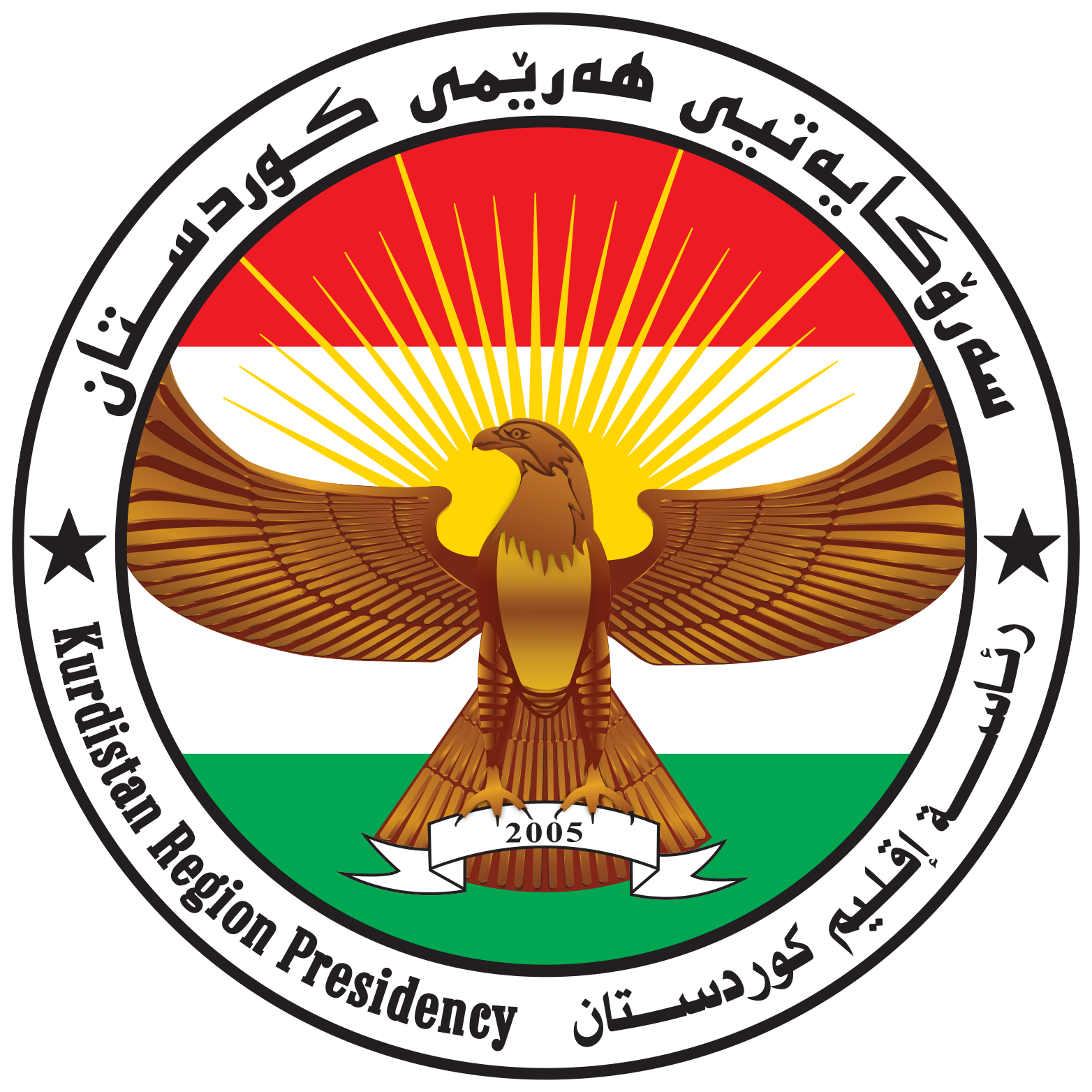

 پەرلەمانی کوردستان
پەرلەمانی کوردستان
